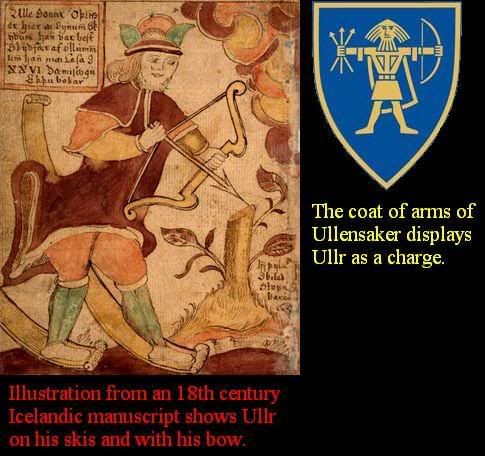Post by bluefedish on Jan 9, 2008 15:13:59 GMT -5
In Germanic paganism, Ullr appears to have been a major god in prehistoric times, or even an epitheton (*wulþuz, Old English wuldor, meaning "glory") of the head of the Proto-Germanic pantheon. Ullr is mentioned on the 3rd century Thorsberg chape and in late Icelandic sources but not much other information regarding the god has survived.
The name Ullr is probably descended from the same word as Old English wuldor and the Gothic wulþus, meaning "glory". The reconstructed Proto-Germanic form is *Wulþuz.
The appearance of Ullr's name in numerous Danish, Norwegian and Swedish place names (for example Ulleråker "Ullr's field" and Ullevi "Ullr's shrine") is further evidence that Ullr had at some point a religious importance greater than is immediately apparent from the scant surviving textual references.
The most notable place names in Norway that contains the name Ullr (or the sideform Ullin) are the following: Ullensaker (municipality in Akershus county), Ullensvang (municipality in Hordaland county), Ullern and Ullevål (boroughs of Oslo) and Ullerøy (island and parish in Østfold county).
In Sweden: Ulleråker (Uppland), Ultuna (Uppland), Ullvi (Västmanland).
Rydberg's Theories
In Viktor Rydberg's idiosyncratic Teutonic Mythology Ullr is the son of Sif and Egill-Örvandill, half-brother of Svipdagr-Óðr, nephew of Völundr and a cousin of Skaði. His father, Egill, was the greatest archer in the mythology, and Ullr follows in his father's footsteps. Ullr helped Svipdagr-Eiríkr rescue Freyja from the giants. He also ruled over the Vanir when they held Ásgarðr during the war between the Vanir and the Æsir.
While most of Rydberg's theories are dismissed as fanciful by modern scholars his idea that Ullr is connected with the elves of Völundarkviða is not absurd. Both seem associated with skiing and hunting and since Ullr's father is not identified as one of the Æsir he may have been of another race.

Selected Source:
en.wikipedia.org/wiki/Ullr
The name Ullr is probably descended from the same word as Old English wuldor and the Gothic wulþus, meaning "glory". The reconstructed Proto-Germanic form is *Wulþuz.
The appearance of Ullr's name in numerous Danish, Norwegian and Swedish place names (for example Ulleråker "Ullr's field" and Ullevi "Ullr's shrine") is further evidence that Ullr had at some point a religious importance greater than is immediately apparent from the scant surviving textual references.
The most notable place names in Norway that contains the name Ullr (or the sideform Ullin) are the following: Ullensaker (municipality in Akershus county), Ullensvang (municipality in Hordaland county), Ullern and Ullevål (boroughs of Oslo) and Ullerøy (island and parish in Østfold county).
In Sweden: Ulleråker (Uppland), Ultuna (Uppland), Ullvi (Västmanland).
Rydberg's Theories
In Viktor Rydberg's idiosyncratic Teutonic Mythology Ullr is the son of Sif and Egill-Örvandill, half-brother of Svipdagr-Óðr, nephew of Völundr and a cousin of Skaði. His father, Egill, was the greatest archer in the mythology, and Ullr follows in his father's footsteps. Ullr helped Svipdagr-Eiríkr rescue Freyja from the giants. He also ruled over the Vanir when they held Ásgarðr during the war between the Vanir and the Æsir.
While most of Rydberg's theories are dismissed as fanciful by modern scholars his idea that Ullr is connected with the elves of Völundarkviða is not absurd. Both seem associated with skiing and hunting and since Ullr's father is not identified as one of the Æsir he may have been of another race.

Selected Source:
en.wikipedia.org/wiki/Ullr



